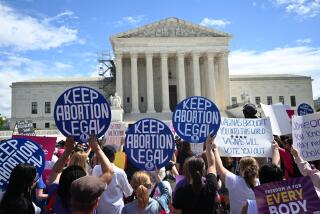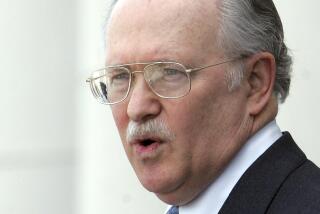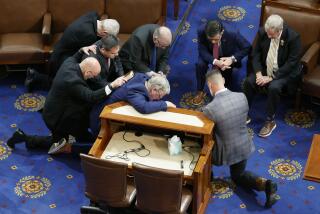Colorado’s day of prayer debate
Like Thomas Jefferson, we believe that the 1st Amendment to the Constitution erects a “wall of separation” between church and state. Government punches through that wall when it requires official prayers in public schools or bestows tax dollars on churches -- or when it tries to prevent believers from practicing their faith.
But the wall of separation is porous enough to allow innocuous interactions of church and state, such as the provision for legislative chaplains (upheld by the Supreme Court in 1983) or the public recognition by individual public officials of religious holidays important to them or their constituents. The federal government is barred by the Constitution from adopting Islam as a national religion, but that doesn’t mean President Bush can’t invite Muslim Americans to the White House for a meal breaking the Ramadan fast.
In these matters, constitutional principle needs to be tempered by a sense of proportion. That’s why we hope the Freedom from Religion Foundation fails in its attempt to have a court forbid the governor of Colorado from declaring a day of prayer.
The foundation -- “the largest association of freethinkers (atheists and agnostics) in the United States,” according to its website -- argued that Gov. Bill Ritter Jr.’s proclamation violated the state Constitution’s equivalent of the 1st Amendment. The group also objected to the proclamation’s use of a Bible verse suggested by the National Day of Prayer Task Force, whose chairwoman is the wife of James Dobson, the founder of the conservative evangelical group Focus on the Family.
Focus on the Family is unquestionably a pillar of the intolerant religious right; witness Dobson’s hysterical opposition to same-sex marriage. But the Scripture verse the group recommended to the governor is neither an open nor a veiled endorsement of right-wing politics -- or of Christianity, for that matter. The verse, from Psalm 28, says: “The Lord is my strength and my shield; my heart trusted in Him, and I am helped.” That passage is similar to the non- sectarian sentiments expressed in prayers offered before sessions of the U.S. Congress or the exclamation “God save the United States and this honorable court” with which the Supreme Court begins its sessions. Unlike prayers in public schools, these religious sentiments aren’t foisted on a captive audience of schoolchildren, nor can they be described as indoctrination.
A purist would insist that prayers in government settings blur the constitutional distinction between church and state. That was the argument made by Michael Newdow, an atheist activist, in 2005 when he unsuccessfully sought a federal court order to prohibit an invocation at Bush’s second inauguration. Pushed to its logical conclusion, such 1st Amendment fundamentalism would forbid presidents of the United States from invoking God in their speeches or participating in the National Prayer Breakfast, a tradition that goes back to President Eisenhower.
Such a rigid view of church-state separation doesn’t have a prayer.
More to Read
A cure for the common opinion
Get thought-provoking perspectives with our weekly newsletter.
You may occasionally receive promotional content from the Los Angeles Times.






